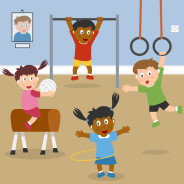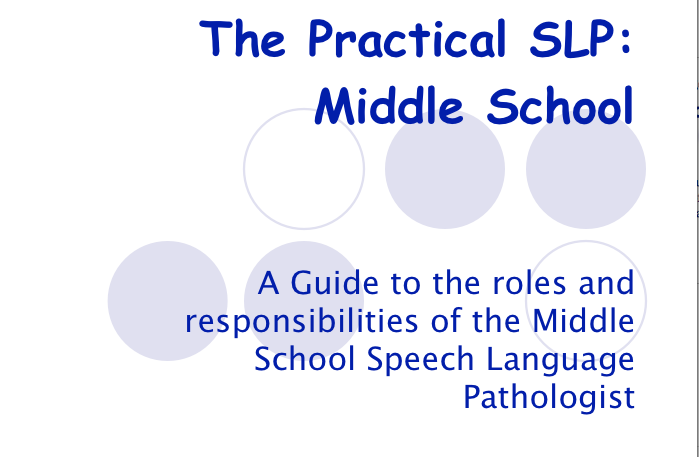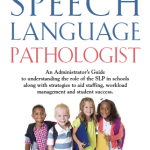Your Middle Schooler
Back in 2007, I launched my first Blog called “Your Middle Schooler: A Unique Age.” It seemed to be a nitche that hardly anyone covered. My initial post read as follows
For the past 12+ years I have worked as a Middle School Speech Language Pathologist. At the same time my own three children swam through the sea of middle school. I guess on some level that makes me a middle school expert. I am not sure about that but I have observed middle school intensively worked with both regular and special education teachers, dealt with administration, observed curriculum development (and lack of it), proctered state level examinations, been involved with displinary issues and watched hormones go crazy. When it comes to middle school I can honestly say, “been there done that.”
When you research Early Childhood development information is overwhelming, everyone has an opinion and free information is available in every toy store and doctors office. However, look for information/advice on anything related to the middle school aged child and your results is limited.
I’ve now had 17 years of wonderful middle school experiences in a variety of different communities. I know that the Middle School years are just as unique and developmentally important as the preschool years. If certain skills are not acquired during the Middle School years, higher level language development and learning will be effected. I hope to continue to provide some a lot of information about language development during the ages of 11-14 and practical suggestions on how to interact with the middle schooler in your life. I welcome any questions, concerns or comments.
Teresa
January 2012
Some of the initial material on this page might be recycled from the original Your Middle Schooler: A Unique Age. Sorry about that, but a review of good ideas never hurts.
I’m back and want your input on SLPs in schools
Well it has been awhile since I seriously worked on my blog. In December I left my school position to start a private practice. In July I made it official forming my own LLC called TBS Speech Therapy. I did a little contracting work earlier this year and have firmed up my first consulting gig for the fall. My school year ended without the usual drama and the amount of time I spent on paperwork was significantly less and compensated. Right now work life is good.
If you follow my blog you know I’ve done a little bit of work on advocacy for SLPs in schools. Writing my book, The School Speech Therapist: An administrators guide to understanding the role of the SLP in schools along with strategies to aid staffing, workload management and student success, presenting at ASHA 2016 and writing articles on my blog, has drawn only a little bit of attention but a lot of support from SLPs finding themselves in similar situations. Frankly, I had to give it a rest for a while when I realized that despite my best efforts I was not able to advocate for myself and get results. I was feeling very much like I was hitting my head against a brick wall while burning out at the same time.
I reached out to ASHA years ago on the topic of advocacy in schools and didn’t get much of a response. At the time all I saw were articles on caseload management. Honestly, I was a pro at caseload management. I mentioned my concerns to SIG 16 at ASHA 2017 and even that went nowhere. However, ASHA 2016 was the turning point for me. The motivational speaker who presented at the opening get together inspired me to make a change.
Now after a nice long hiatus and a fun/relaxing summer, I’m feeling productive again. I want to write and article on why SLPs leave school based positions (and also maybe why they don’t leave). I would love any and all input. I’m pretty sure I know what I’m going to hear but I want to see if there is a pattern.
You can tell me your thoughts here, PM or respond on my facebook page, The School Speech Therapist or send an email to theschoolspeechtherapist@gmail.com All is confidential. Thanks Teresa
March 2, 2016 Read Across America Day
March 2nd is The National Education Association’s Read Across America Day. Read more about it on the NEA website . Does your school do anything special for the Event. My school usually does a little something to rah rah reading. While this is a very important event, don’t forget to encourage your students or your children to read all the time. Reading is a great way to develop language, vocabulary and background knowledge.
Lots of cute t-shirts out there to celebrate the day and of course the required Dr. Suess hat
How SLPs can deal with Middle School rudeness
I received a question from a middle school therapist asking if I had any suggestions on how to deal with rude disrespectful students. No other information than that in terms of community, severity of students, size of groups or gender. From my 15 plus years of experience at the middle school level I think I relate to the situation she might be in. I’m going to assume her students are mainly boys and basically language/learning disabled students.
Three things to consider. First, Speech Language Pathologists do not also have to be experts in behavior. We have enough on our plate. Second, the rules have changed just in the past few years and we are not always allowed to use our professional judgement on who will continue to benefit from therapy and who will not. Third, middle schoolers specialize in rudeness, but it shouldn’t be consistent.
As few as 5 years ago I was able to go into a middle school annual review meeting, explain any behavioral difficulties that might be going on. I would proceed to tell the parent that the student isn’t working in therapy and not really getting anything out of it. Parents usually realized the issue because they were dealing with similar behaviors or complaints at home. We kept any language accommodations and modifications in place but the student was officially discharged from therapy. These days students have to “test out” of therapy before they can be discharged. We all know that “testing out” rarely happens for our language kids. Hence our professional judgement is ignored by the system. However, at least at a 3 year reevaluation you can bring up concerns around not continuing to benefit from services.
They are middle school aged children and figure if they keep behaving badly they eventually won’t have to go to therapy. Keep in mind that these children are probably having considerable difficulty in middle school as the language demands in all subjects quickly becomes more difficult. Going to therapy isn’t cool. I’ve been fortunate to work in schools for the past 20 or so years that have been on the cutting edge of integration services. Most kids accept each other and do not pay much attention to the limitations of typical language/learning disabled students. You might want to consider your schools history in terms of special education integration.
I use to be able to tempt the students with food treats once in a while. However, that was before all the food rules schools now have. A granola bar, cookies, dum dum pops or a stick of gum went a long way. By feeding them it showed I cared. It was something special to look forward to and most middle schoolers are hungry all the time.
Some middle school students that were embarrassed to be in speech therapy, especially if someone had the bight idea for me to see them in the classroom. Rudeness could be the result of embarrassment.
If you think you students are embarrassed about having to go to therapy here are some suggestions.
- Talk to them about therapy, what they are working on, who made the decision that they would have to see you (yes include parents), try to do pull out therapy whenever possible. Polling my middle school students over the years, few wanted me breathing down their necks, in the classroom with their friends watching.
- Spend time working gently on raising awareness of their language needs
- Don’t label your door if you don’t have to. If you do just put your name.
- I think all therapy rooms should have windows in their doors but make the student’s seat placement outside the view of the window so their friends don’t see them.
- Explain any scheduling decisions
- Don’t show up at the classroom door to pick them up, make a phone call to class instead.
Here are some other suggestions you might try
- If the groups aren’t working try changing them up (I realize that is easier said than done because our scheduling is based on the school schedule). Are your groups too big to manage?
- Try changing your therapy methods to make activities more fun. Throw in a game once in a while, even if it is a game that has little to no educational value.
- Laugh with your students. I created a joke curriculum that focused on many aspects of ambiguous and figurative language along with vocabulary.
- Occasionally give them a day off, especially if there is something going on in class that they want to be part of. Cut session short once in awhile, they like that. (this of course depends how strict your administration is on comp services)
- Be firm, make it clear that you are tired of their rudeness. It’s ok to use your mean teacher voice when necessary. Follow up with an activity that they like then thank them for their cooperation or tell them this was a fun group.
- Occasionally bring in classwork and let them finish homework, help them muddle through a book they’re reading.
- Design some activities where they can get up and move around. A white board comes in very handy for this.
If these suggestions don’t have any effect, its time to bring your issues to the principal or vice principal. It might be a good issue to pose to teachers at staff meeting. Teachers and counsellors might be able to provide some insight or even support. At the very least you’ll find out if this is a general school issue or individual specific. More than likely these kids are rude everywhere not just in therapy.
As mentioned earlier middle schoolers specialize in rudeness. Our language disabled students have difficulty knowing when it might be ok to be rude and when it isn’t. Most middle schoolers will not be blatantly rude to adults other than their parents but it does happen. Keep in mind they’re a bundle full of hormones and sometimes can’t help it. Rudeness shouldn’t happen on a consistent basis. If you see a problem try talking privately to the student about it or if you know there are issues mention it to the guidance counsellors/school psychologists.
Middle School Therapists, please feel free to add any additional suggestions
Good Luck
55 Movies Every Kid Should See and Talk About (before they’re 13)
As a speech language pathologist I always look for fun ways to encourage language development. No matter what I am looking at or reading, my mind is always thinking about how I can present or modify the information/activity to benefit my students (or my own kids). This week I read an article in Entertainment Weekly titled “The 55 Essential Movies Kids Must Experience (Before They Turn 13).” Then I noticed my own young adult children joking with each other by quoting lines from TV/movies or talking about characteristics of memorable characters. Sometime these conversations go deeper discussing the music used in movies, the historical relevance/mistakes, continuity/goofs and trivia.
There is a lot of language that can be learned from TV and Movies. Think about some of the animated Disney or Pixar films that constantly use play on words and sarcasm. Many of these movies have over dramatized scenes that get the humor or point across. These movies pair fun visuals with novel language and kids pick it up. The novel language is also presented in context, making it easier for kids to figure out. They also benefit from hearing the appropriate intonation or sarcastic tone. With video streaming watching a movie more than once is the norm so kids hear movie language over and over.
Use this list of the “The 55 Essential Movies Kids Must Experience (Before They Turn 13)” as a guide to choosing a movie some night when you can’t find anything good on tv. Note that many of these movies are a little old or are based on books. That doesn’t make them any less valuable language wise.
Even though I’ve always personally been drawn to tv and movies, I still recommend reading the book before seeing the movie. Reading will stimulate and help to develop kids inner visualization and visualization is key to language comprehension and critical thinking. Discussing differences between books and movies can also be a lot of fun
Watch movies together once in awhile and after the movie, talk about it. Ask questions beyond “Did you like it?”, quote the lines from the movie once in awhile, sing songs from the movie and bring up movie scenes when they might relate to something currently going on in your child’s life.
This list of 55 in not totally comprehensive. There are a lot of good movies for children and especially tweens that will broaden their language skill and make them think. What movies would you add to this list and for what age level?
Amazon Prime makes it easy to find and stream movies, some free some not. If you shop Amazon a lot, Prime ends up paying for itself.
Lets be realistic about school wellness programs…then maybe they’ll work
Last week a friend sent me another article on Michelle Obama’s Lets Move Campaign. The article focused a new policies where “unhealthy foods” would not allow to be advertised during the school day. In particular the article referred to the advertising of certain CocaCola company products not being allowed in schools. Keep in mind how much support the Coca-Cola company has given to many causes over the years, especially the Olympics.
“The idea here is simple – our classrooms should be healthy places where kids aren’t bombarded with ads for junk food,” the first lady said. “Because when parents are working hard to teach their kids healthy habits at home, their work shouldn’t be undone by unhealthy messages at school.” M. Obama
I am a little perplexed by what Mrs. Obama is trying to do. I’ve worked in schools for almost 30 years. I’ve never seen junk food advertising in any classroom. I haven’t seen a soda machine in schools for years. It seems as though she is trying to accomplish something that common sense dictated years ago. I’ve never seen advertising of any kind other than occasional vending machines in any school at any time. So basically Mrs. Obama is trying to achieve something that was initiated and successfully addressed at least 20 years ago. It’s also seems contradictory that advertising of “diet” drinks are going to be allowed. Personally I think the chemicals in diet drinks are even less healthy for children. Mrs. Obama, should we be promoting diet drinks to our school children?
I agree with the basic premise of Mrs. Obama’s Lets Move Campaign. When I look around any school I see many more kids that are heavier than they should be. But she is really missing the mark going after the large companies to decreasing their advertising basically because few actually advertise in schools and none on a large scale basis. Mrs. Obama should look at the name of her campaign and focus on getting kids moving. Schools can modify their schedules to extend recess, spend more time outside, make lunch more relaxing (and social) and provide better school lunches. Why focus on taking away something that is hardly there.
If Lets Move wants to support better nutrition in general, it should start a little closer to home. I’d like to know if Michelle Obama has ever seen or eaten a public school lunch? It’s been my experience to see, small portions served on cardboard or styrofoam trays, food that has been in a warmer for hours (yes hours), unappealing choices, mushy or dehydrated food and frankly poor quality food. Food programs at most schools have switched over from having school cooks to food services where the cooked food is shipped in and kept in warmers. Peek in any trash barrel in any school cafeteria and you will see just how much of “school food” is thrown out. When this much food it inedible or unappealing and not consumed, children have to be starving by the end of the school day. This can’t be good for blood sugar levels.
So how much are kids actually moving in a typical school day? This is going to vary from school to school. It’s been my experience that students have anywhere from 30-40 minutes to shove in their lunch wait for everyone to finish and then run out side to play for 15 or so minutes. Schools rarely provide playground equipment and frankly most kids don’t know how to organize games anymore. Recess is usually inconsistent lasting 15-30 minutes at most. Middle schoolers rarely get recess at all. In the winter time students in cold climates are at times confined to their classroom the whole day. Physical education classes meet for an hour once or twice a week. It’s also important to note that even if schools or principals want to increase their students movement time, the demands of Common Core puts significant limits on time allotted for recess and physical education.
How many exercise opportunities do children have outside the school day? Schools have so much to cover that even with the best intentions, schools can teach healthy habits but cannot provide adequate opportunities to exercise. Perhaps Mrs. Obama’s program should put more effort into developing opportunities to exercise outside of the school day and encouraging parents to take advantage of those opportunities. Instead of alienating large corporations such as Coca-Cola use them to help fund new exercise, sports or dance programs. Children especially from less affluent communities have fewer opportunities to join organized teams, exercise programs or lessons.
Children from all socioeconomic levels are spending an inordinate amount of time playing video games. This is hard to believe but some students actually believe they are playing sports when playing video games. Children are now being raised by video gamers and instead of shooting hoops in the backyard, parents and children now play video games together. If they’re playing video games they are usually not getting much exercise. Perhaps if Michelle Obama and Let’s Move is so adamant about going after corporations that produced less than nutritious food then perhaps they should also go after video game manufacturers since video games keep kids from moving. An awful lot of computer games are used in schools too, some with little to no educational value.
Let’s Move has been in place for 4 years now and other than absurd wellness programs that have infiltrated schools I haven’t seen many changes in students physical well being. These wellness programs have sucked all the fun out of any school celebration since no treats of any kind are allowed. Basically you can’t give a hungry kid a granola bar anymore. Even students who have yearly physicals are being weighed at school and told they are fat in very public ways. And to top it off school lunches are still awful. It’s time to be a little more realistic when it comes to developing wellness programs in schools. Mrs. Obama should put some initiatives together that are realistic, actually have a chance to be successful and might accomplish something.
Setting examples for good nutrition and exercise in schools:
- Provide nutritious and appealing meals for school lunches
- Have school lunches prepared at schools and use locally grown veggies and fruits whenever possible
- Build in more time for a relaxing meal
- Don’t have kids eat where they work even at snack time
- Allow wellness plans some flexibility, reasonable treats should be allowed on special occasions.
- Allow more time for recess, provide typical playground equipment and teach students how to organize typical playground games.
- Allow longer and flexible breaks after lunch especially for older students where they have some choice on how they manage their time
- Provide physical education classes at least 2-3 days a week, rather than focus on playing games, teach underlying skills, traditional and other types of exercises, how to organize games and provide cardio workouts.
- Provide an outdoor recess whenever possible.
- Encourage students to participate in community based opportunities to exercise, play organized sports or take lessons such as dance or gymnastics.
Middle School Nerves
It’s that time of year again, school here in the northeast is getting ready to start. For some kids the start of a new middle school experience is exciting and for others it can be a very nervous time. If you’ve ever smelled a group of school full of 6th grade students during the first few days of school you’d realize this. My advice to parents is to be supportive, ask a few probing questions, not too many. Make sure you ask about any concerns they might have expecially around school work and peer relationships. However, keep in mind middle schoolers are also worried about simple things like, being able to open a locker and knowing where to go.
A few years ago, I reviewed the book A Smart Girl’s Guide to Starting Middle School. I think it gave some very practical information and strategies for middle schoolers in general. I wish ther was a boys version of this book.
This week I also received this link in an email 20 Blogs with the Best Tips for New Middle Schoolers. I haven’t had a chance to look over all the information or sites, but the titles are relevant.
Kiss your babies goodbye when the leave for middle school but keep in mind they still need you to be involved, just on a different level.
The Practical SLP: Middle School
Back in 2007, when I was taking a computer course and needed to put some teacher training together I chose to write about the roles and responsibilities of the School Speech Language Pathologist. It was a nice introduction for the teachers and for those who paid attention, I think they learned something about our field. This was just before RTI, core curriculum and the new teacher evaluation process took over. Reflecting on what I wrote 6 years ago, our job hasn’t changed that much…..it’s just been added to. So take a look, please note the word “Practical” in the title. At the time when all these changes were looming I thought it was appropriate (and still do). The Practical SLP powerpoint 2007 copy
Teresa
Speech Language Pathology Humor……..A linguistic dissection of 7 annoying teenage sounds
I will be the first one to admit most Speech Language Pathology Humor is pretty lame. However, I came across this article and short video and got a huge laugh out of it. Some day when I have time I’ll have to write an article on the humorous side of our profession. We all know the way our field is going we all need a good laugh.
Games Can Be Fantastic Therapy Tools
I have always said that I can turn or modify any game into an educational experience. Me at my advanced years was thinking only about board games. Over the years I’ve been able to teach almost every single language skill through conventional games. Unfortunately, those days are numbered because it’s hard to collect data when your having fun.
I was extremely pleased when I came across this article on Geekslp.com Angry Birds Educational Tool. This article truly validates what I already know. I am so glad the younger generation of SLP’s are able to see the value of games in learning. I love angry birds but never even thought to bring it into my therapy as a tool but I have used it as a reward. Why I never thought of this I don’t know. This article presents an excellent perspective and shows just how creative speech language pathologists can be.
Reality is kids just don’t know how to play anymore. Our students are usually at an even bigger disadvantage for knowing how to initiate play with others, feel successful and how to accept wins/losses gracefully. Anytime we play a game with our students we are providing a learning experience that they will not get from their peers or even their parents.
I actually have a whole section on my blog called Modify that Game, which I will admit is dated with it’s information. Still the point is there, games can have educational value.
My last article on gaming was back in June.
I was following up on an article a friend sent me. Basically I said that video games are good but you would still need a skilled teacher to fill in the gaps. I’m not a video gamer so I reserved making any harsh judgements.
However, I was writing about the importance of play long before that. The Importance of Play
I am still amazed at the number of children I encounter that truly don’t know how to play and I’m not just talking about our language disabled kids. Kids are so managed these days that they are loosing their negotiation skills, critical thinking skills, imaginations, flexibility with interpersonal skills and play skills.
Recently an SLP contacted me to tell me that she was not allowed to use games in therapy any more. I thought how sad that we’ve gotten to the point where fun had to be squashed in order to make sure kids pass a test or that enough data gets collected. I figured that was the reason or that their administration was nuts.
Enjoy the articles highlighted above, put a little bit of fun into your therapy setting, worry about data collection around progress report time. Modified games can play a huge role in therapy not to mention increase motivation. Funny that it’s more accepted if the games are presented on the computer or iPad that out of a dusty old box. However, games are much easier to modify out of the dusty old box. Personally I can see the value in both conventional games and some computer games/apps. Just like conventional games and therapy games, there are a lot of junky computer games and apps that are not worth even trying out.
Out of Range Testing for Severely Impaired Students
This question has come up again? Many therapists are put in positions where they have to test severely involved students who are perhaps not even on their caseload or in outside placements. I know the law says we have to test but how do you do this and make it valid. As far as I know other than some checklists, there is nothing out that that really looks at functional language. I’ve seen the checklists and often you have to modify them to fit the students needs and levels. Then what do the results tell you anyway? There’s usually not cut off to say therapy will be beneficial or not or even guidelines to help you with goals.
Seriously, how do you put an age or level on the language of the severely impaired. There must be a way to describe language or a tool out there that might help. If you have any suggestions please share. I may even consider a short survey to see what others are doing.
Back in February I wrote this article on evaluating out of range students. Some of the suggestions work for me but I’m not sure it is the best way to evaluate. Out of Range Testing for Severely Impaired Students











